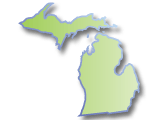Michigan Rebates and Incentives Summary

Michigan, more exactly Detroit, is known as motor city and rock city. This history conjures images of black leather, KISS and an awful lot of gasoline. This petroleum-driven economy has faced significant challenges. Motor City was hit hard by the recession, and the whole state has been trying to reinvent itself and encourage industry and individuals to invest in the state’s future. Renewable energy has been central to this reinvention, and even General Motors and Ford have adopted solar energy.
In 2008, Michigan passed its Renewable Energy Standards (RES). Under the RES, all of Michigan’s utilities must source at least 10 percent of their energy from renewable sources by 2015. The state’s legislature has been debating how to amend the RES for 2016 and beyond. Central to the debate is whether to lift the mandatory 10 percent renewable energy mandate and changing the net metering law.
Solar particularly benefited from the RES, being the fastest growing segment of the economy in the state during the last decade. Michigan ranks thirty-second in the nation for solar capacity, but installations were up by 33% in 2014.
The majority of Michigan’s electricity comes from coal-fired plants and nuclear power. Michigan also has substantial natural gas reserves, and this fossil fuel accounts for more energy usage than any other single source. Although Michigan is a northern state and has harsh winters, it still receives enough sunlight to warrant solar. As a northern state with cold winters, Michigan also incentivizes insulation and energy efficiency investment for homes and buildings to help reduce their energy use.
, full_html